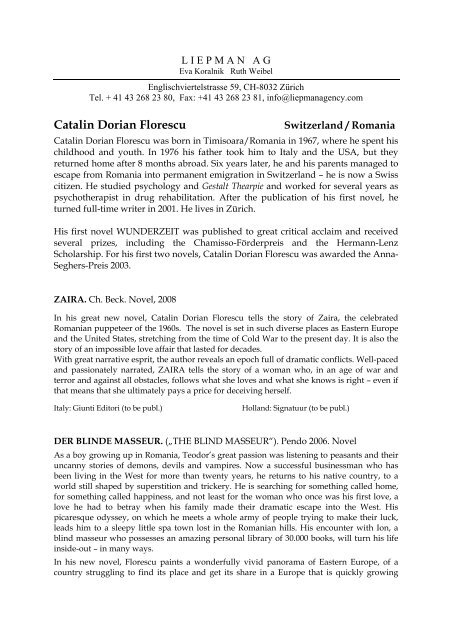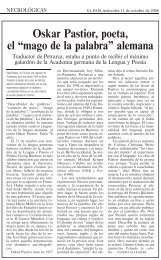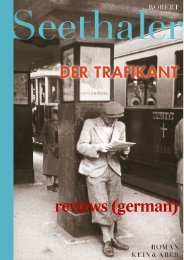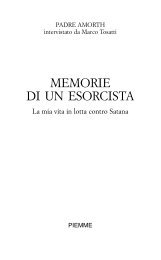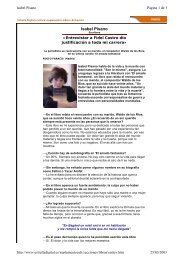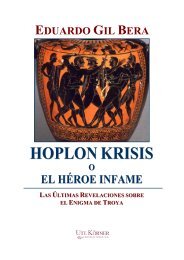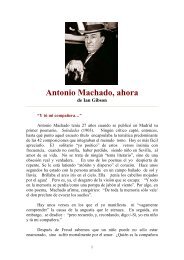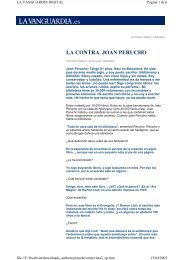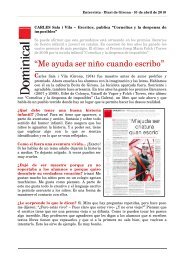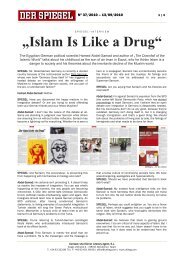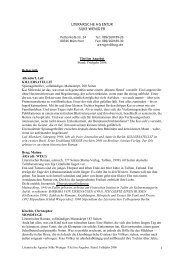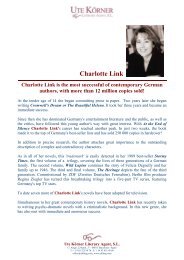Catalin Dorian Florescu
Catalin Dorian Florescu
Catalin Dorian Florescu
Create successful ePaper yourself
Turn your PDF publications into a flip-book with our unique Google optimized e-Paper software.
L I E P M A N A G<br />
Eva Koralnik Ruth Weibel<br />
Englischviertelstrasse 59, CH-8032 Zürich<br />
Tel. + 41 43 268 23 80, Fax: +41 43 268 23 81, info@liepmanagency.com<br />
<strong>Catalin</strong> <strong>Dorian</strong> <strong>Florescu</strong><br />
Switzerland / Romania<br />
<strong>Catalin</strong> <strong>Dorian</strong> <strong>Florescu</strong> was born in Timisoara/Romania in 1967, where he spent his<br />
childhood and youth. In 1976 his father took him to Italy and the USA, but they<br />
returned home after 8 months abroad. Six years later, he and his parents managed to<br />
escape from Romania into permanent emigration in Switzerland – he is now a Swiss<br />
citizen. He studied psychology and Gestalt Thearpie and worked for several years as<br />
psychotherapist in drug rehabilitation. After the publication of his first novel, he<br />
turned full-time writer in 2001. He lives in Zürich.<br />
His first novel WUNDERZEIT was published to great critical acclaim and received<br />
several prizes, including the Chamisso-Förderpreis and the Hermann-Lenz<br />
Scholarship. For his first two novels, <strong>Catalin</strong> <strong>Dorian</strong> <strong>Florescu</strong> was awarded the Anna-<br />
Seghers-Preis 2003.<br />
ZAIRA. Ch. Beck. Novel, 2008<br />
In his great new novel, <strong>Catalin</strong> <strong>Dorian</strong> <strong>Florescu</strong> tells the story of Zaira, the celebrated<br />
Romanian puppeteer of the 1960s. The novel is set in such diverse places as Eastern Europe<br />
and the United States, stretching from the time of Cold War to the present day. It is also the<br />
story of an impossible love affair that lasted for decades.<br />
With great narrative esprit, the author reveals an epoch full of dramatic conflicts. Well-paced<br />
and passionately narrated, ZAIRA tells the story of a woman who, in an age of war and<br />
terror and against all obstacles, follows what she loves and what she knows is right – even if<br />
that means that she ultimately pays a price for deceiving herself.<br />
Italy: Giunti Editori (to be publ.)<br />
Holland: Signatuur (to be publ.)<br />
DER BLINDE MASSEUR. („THE BLIND MASSEUR“). Pendo 2006. Novel<br />
As a boy growing up in Romania, Teodor’s great passion was listening to peasants and their<br />
uncanny stories of demons, devils and vampires. Now a successful businessman who has<br />
been living in the West for more than twenty years, he returns to his native country, to a<br />
world still shaped by superstition and trickery. He is searching for something called home,<br />
for something called happiness, and not least for the woman who once was his first love, a<br />
love he had to betray when his family made their dramatic escape into the West. His<br />
picaresque odyssey, on which he meets a whole army of people trying to make their luck,<br />
leads him to a sleepy little spa town lost in the Romanian hills. His encounter with Ion, a<br />
blind masseur who possesses an amazing personal library of 30.000 books, will turn his life<br />
inside-out – in many ways.<br />
In his new novel, <strong>Florescu</strong> paints a wonderfully vivid panorama of Eastern Europe, of a<br />
country struggling to find its place and get its share in a Europe that is quickly growing
closer together, and of people caught in the gap between their dreams of the West and the<br />
realities of their Eastern world.<br />
Holland: Arena, 2007 Romania: Polirom, 2007<br />
Spain: Lengua de Trapo, 2007<br />
Italy: Giunti Editori (to be publ.)<br />
France: Liana Levi, 2008<br />
DER KURZE WEG NACH HAUSE. * („THE SHORT WAY HOME“). Pendo 2002. Novel<br />
For the first time after his escape into the West, 23-year-old Ovidiu – a Romanian living in<br />
Switzerland – returns to his home country in 1990. Vienna, Budapest, Timisoara are the<br />
stations of a trip ending at the Black Sea resort Mangalia, a trip that confronts Ovidiu with<br />
his past and makes him look at Romania with the eyes of the one who has been away. A trip<br />
that also forces him to re-evaluate his friendship with Luca, his schoolday friend from Zürich<br />
with whom he shares a great passion for the movies and who precedes and accompanies him<br />
on his trip – and whose unholy influence Ovidiu needs to throw off.<br />
“Talent is not enough if you want to tell stories the way <strong>Catalin</strong> <strong>Dorian</strong> <strong>Florescu</strong> does. You need to<br />
have grown up amongst storytellers, where all possible kinds of stories – believable and phantastical –<br />
are passed on by word of mouth.” – FAZ<br />
“<strong>Catalin</strong> <strong>Dorian</strong> <strong>Florescu</strong>’s storytelling makes the pages bloom.” – Der Standard<br />
“Both of the author’s novels are impressive in their abundance of bitter and wonderful stories. Thus,<br />
they broaden our horizon towards the East.” - Spectrum<br />
„Here is Ian McEwan, but with far greater humour, irony and salt. A unique overview of life in<br />
Eastern Europe during and just after the last days of Soviet rule” – New Books in German, Fall 2002.<br />
WUNDERZEIT. * („TIME OF WONDERS“). Pendo 2001. Novel.<br />
1982: 15-year-old Alin and his parents are just about to escape from Romania and cross into<br />
Yugoslavia. In the harrowing time of waiting at the border post, Alin thinks back to his<br />
childhood, to how his parents dreamed of escape, of the West, of a mythical, paradisiac<br />
America – and how their dream nearly came true: In 1976 his father manages to take Alin for<br />
medical treatment to Italy – and from there on to the miracle of miracles: New York. But the<br />
father’s American dream turns into a nightmare of failure and despair, and the two return<br />
home – accepting that they might never again get a second chance to leave their oppressive<br />
country. WUNDERZEIT brings a boy’s magical childhood in Ceaucescu’s Romania to<br />
tangible life. It depicts a world of wonders and a child’s oblivious dissidence in the face of<br />
the paranoia of a dictatorial regime. And it shows what it means to leave home – even if it is<br />
a terrible place – in hope of finding a new home.<br />
“An unpretentious and realistic account of an early coming-of-age, taking its measure in precisely<br />
observed details and small gestures, and therefore all the more authentic.” – Frankfurter Rundschau<br />
“A modern picaresque novel, whose limping and dreaming hero Alin is a younger and more<br />
innocuous brother of the “Tin Drum”’s dwarfish Oskar Matzerath.” - FAZ<br />
“Refreshingly light and devoid of any pretentiousness. […] This debut is proof of an original, highly<br />
talented story-teller with his own genuine voice, thrilling and entertaining, full of images and ideas,<br />
which one would love to listen to for many more pages.”- Der Bund<br />
*foreign rights handled by Pendo Verlag, Munich
<strong>Catalin</strong> Florian <strong>Florescu</strong><br />
Zaira<br />
(Zaira)<br />
Verlag C.H. Beck, February 2008, 478 pp. ISBN: 978-3-406-57029-2<br />
Once upon a time in Romania<br />
Zaira is a beautifully constructed, sweeping novel, which<br />
takes the reader on a dizzying journey spanning countries,<br />
continents, major political events and the whole lifetime<br />
of the female protagonist, Zaira herself, who is also the<br />
narrator. As for the real author, <strong>Catalin</strong> <strong>Dorian</strong> <strong>Florescu</strong>,<br />
he succeeds in that most difficult of feats – a male author<br />
assuming an authentic female voice. He also avoids<br />
the long, intricate sentences one might expect from a<br />
work reminiscent in its scope, detail and ambition of a<br />
Middlemarch or even a Buddenbrooks. Instead he breaks<br />
up his sentences, which in consequence sometimes take on<br />
a new meaning retrospectively. Another achievement is the<br />
way in which Zaira’s voice matures as she grows older, thus<br />
enabling the reader to hear as well as see her development.<br />
Zaira is born into a privileged family of powerful landowners<br />
in feudal pre-Second World War Romania. She is virtually<br />
abandoned by her mother, who prefers the privileged life of<br />
a Romanian cavalier officer’s wife in Bucharest to bringing<br />
up a child, and left in the care of her Aunt Sofia, who<br />
herself was left by her husband after her only child, Zizi,<br />
was born. It is Zizi in fact who is responsible for instilling<br />
in Zaira the love of fantasy and story-telling that influences<br />
not just her future career, but her whole attitude to life.<br />
Also significant is the influence of the child’s pious and<br />
austere grandmother, the primary model for the series of<br />
damaged, emotionally aloof women who populate the book.<br />
No less important are the throng of rustic characters, from<br />
Zsusza, the Hungarian cook, to Misa the family’s alcoholic<br />
coachman. All these are part of a culture and a way of life<br />
that will finally disappear during the Second World War, with<br />
the arrival of first the Germans and then the Communists,<br />
during and after which the author depicts, through Zaira’s<br />
eyes, a whole era of deracination. The tale moves on to<br />
America in the troubled 1960s and 1970s and finally<br />
back home, where the hectic, switchback fortunes and<br />
misfortunes of this strange but spirited woman end.<br />
To belong, to have a home, a class, a culture – this perhaps is<br />
the author’s underlying theme. A magnificent achievement.<br />
© Judith Stadler<br />
<strong>Catalin</strong> Florian <strong>Florescu</strong><br />
was born in Timisoara, Romania, in<br />
1967, where he spent his childhood<br />
and youth. In 1976 his father took him<br />
to Italy and the USA, but they returned<br />
home after eight months abroad. Six<br />
years later, he and his parents managed<br />
to escape from Romania to permanent<br />
emigration in Switzerland – he is now<br />
a Swiss citizen. He studied Psychology<br />
and Gestalt Therapy and worked for<br />
several years as a psychotherapist in<br />
drug rehabilitation clinics. Following<br />
the publication of his first novel in<br />
2001, he became a full-time writer.<br />
He lives in Zurich.<br />
Previous works include:<br />
Wunderzeit (2001); Der kurze Weg<br />
nach Hause (2002); Der blinde<br />
Masseur (2006) – all Pendo Verlag.<br />
Prizes include:<br />
Hermann Lenz Scholarship (2008);<br />
Dresden Writer-in-Residence (2008);<br />
Anna Seghers Preis (2003);<br />
Camisso Scholarship of the<br />
Bavarian Academy (2002).<br />
Rights to this work sold to:<br />
Giunti Editori (Italy)<br />
Application for assistance with<br />
translation costs – Switzerland<br />
Translation rights available from:<br />
Agentur Liepman AG<br />
Englischviertelstrasse 59<br />
CH-8032 Zurich, Switzerland<br />
Tel: +41 43 –268 23 80<br />
Email:<br />
Marianne.fritsch@liepmanagency.com<br />
Contact: Marianne Fritsch<br />
www.liepmanagency.com<br />
The Liepman Literary Agency,<br />
founded in 1949, represents American,<br />
British, Canadian, French and Israeli<br />
publishers and agents for German<br />
language publication rights as well<br />
as international authors for their<br />
world rights.<br />
For details about Verlag C.H. Beck<br />
please contact the editor.<br />
‘An adventurous, exciting story that<br />
grips you to the end. Zaira is an<br />
outstanding and beautiful account of<br />
the literary landscape that is Central<br />
Europe.’ – Die Presse<br />
‘C.D. <strong>Florescu</strong> has written a proud,<br />
exciting novel, richly bedecked with<br />
memories.’ – Die Welt<br />
FICTION 17
10. Juni 2008<br />
WELTGESCHICHTE ALS ROMAN<br />
Kühe, Panzer und Revolutionen<br />
Von Christoph Schröder<br />
Wie bleibt man selbst, wenn die äußeren Umstände verlangen, dass<br />
man ein anderer wird? Der Autor <strong>Catalin</strong> <strong>Dorian</strong> <strong>Florescu</strong> verbindet<br />
in einem monumentalen Roman rumänische Geschichte mit dem<br />
wechselhaften Leben einer Frau.<br />
Man kann das beinahe größenwahnsinnig nennen. Zunächst einmal, weil ein<br />
Mann einen Roman durchgehend aus der Perspektive einer Frau schreibt, an<br />
sich schon ein Wagnis. Und: ein Buch, das sich vornimmt, ein ganzes<br />
Jahrhundert in seinen ideologischen Verwerfungen abzubilden. Ein knapp 500<br />
Seiten starkes Werk, das über die Jahrzehnte hinweg in das Leben seiner Figur<br />
die Weltgeschichte kunstvoll einarbeitet.<br />
Man liest in den Verlagsvorschauen immer wieder einmal eine Ankündigung<br />
dieser Art und winkt ab. <strong>Catalin</strong> <strong>Dorian</strong> <strong>Florescu</strong>, 1967 im rumänischen<br />
Timisoara geboren und heute in der Schweiz lebend, ist mit seinem neuen<br />
Roman "Zaira" all diesen Ansprüchen sehr nahe gekommen. Er erzählt davon,<br />
wie Menschen von den äußeren Umständen verändert werden. Und auch davon,<br />
wie sie sich selbst trotz der äußeren Umstände treu bleiben können.<br />
Zaira also heißt <strong>Florescu</strong>s Heldin. Sie entstammt einer<br />
reichen Gutsherrenfamilie. Die Mutter zieht es in die Stadt,<br />
wo das Leben pulsiert; der Vater, ein hochrangiger Soldat,<br />
bleibt ein großer Unbekannter. Als Ausgleich dafür hat Zaira<br />
gleich mehrere Mütter und Zizi, den Cousin, der zur zentralen<br />
Figur ihrer frühen Kindheit und Jugend wird und ihr eine<br />
Parallelwelt eröffnet: die des Theaters.<br />
Zaira wächst auf in einer Welt, in der Stolz und<br />
Standesbewusstsein selbstverständlich sind. Umso härter<br />
trifft dann der Gang der Historie die Familie: Zunächst<br />
kommen die Nazis mit ihren Panzern auf dem Weg nach Stalingrad vorbei (just<br />
in jenem Moment übrigens, in dem der adoleszente Paul mit hochrotem Kopf<br />
Zairas Brüste berühren will). Später kommen die Kommunisten und sind um<br />
keinen Deut besser. Sie machen die ehemaligen Gutsherren zu Bettlern, rauben<br />
ihnen Vieh, Land und Macht und, jedenfalls einigen, auch die Würde.<br />
Nicht so Zaira, deren Leben zu einer Odyssee wird durch die Zeiten und über die<br />
Kontinente, durch Liebesaffären und Enttäuschungen. <strong>Florescu</strong> führt den Leser<br />
in das kommunistische Rumänien der Nachkriegszeit. Nach Prag, wo die<br />
Reformbestrebungen Dubceks soeben von russischen Panzern überrollt werden.<br />
Und schließlich nach Washington - jene Stadt, in der Martin Luther King seine<br />
berühmte Rede gehalten hat.<br />
1/2
10. Juni 2008<br />
Zaira wird von der Gutsherrentochter zur Puppenspielerin; sie wird zur Mutter<br />
einer höchst schweigsamen und schwierigen Tochter, die ihr die Vaterlosigkeit<br />
nie verzeihen wird; sie lässt ihre große Liebe zurück, weil die nicht von der<br />
Flasche lassen kann, baut sich in den USA eine neue Emigranten-Existenz auf<br />
und erlebt dort eine weitere einschneidende Enttäuschung. Zu der Beerdigung<br />
ihrer Eltern, die vom Staat weiterhin als Klassenfeinde auf das Übelste<br />
gegängelt werden, fährt Zaira nicht: "Die haben in meinem Leben gefehlt, jetzt<br />
fehle ich an ihrem Grab", denkt sie sich.<br />
<strong>Florescu</strong> erzählt diese Biografie frei von jeder symbolisch-überladenen<br />
Aufdringlichkeit. Es geht stets darum, wer auf welche Weise Macht über wen<br />
ausübt, und immer wieder findet <strong>Florescu</strong> Bilder, die das Große im Kleinen<br />
spiegeln, schreibt er Szenen von großer Prägnanz. Und ihm gelingt die<br />
Charakterstudie einer Frau auf ihrer Gratwanderung zwischen Stolz und<br />
Sturheit, zwischen Mut und Hochmut. Eine Frau, deren Leben, wie es immer<br />
wieder heißt, "eine Schwindel erregende Reise" ist. In einem Augenblick, als sie<br />
bereits in den USA ist, denkt Zaira, dass nun, da schon so viele ausgestiegen<br />
sind, das Karussell aufhören könnte, sich zu drehen, um den Schwindel zu<br />
stoppen, der sie beherrscht. Aber das Karussell wird sich weiterdrehen.<br />
In einem Beitrag zu einem Symposium mit dem Titel "Wo ist der Platz zum<br />
Leben" sagte der Autor: "Je früher man seine Heimat verlassen hat, desto<br />
stärker bleibt sie in der Erinnerung magisch überhöht, man weist ihr die<br />
Qualität der Heilung zu oder der Linderung jener Schmerzen, die das Exil<br />
zugefügt hat." Das ist ein Satz, der auch auf <strong>Florescu</strong>s Heldin zutrifft.<br />
<strong>Catalin</strong> <strong>Dorian</strong> <strong>Florescu</strong>: Zaira<br />
C.H. Beck Verlag, München; 478 Seiten; 19,90 Euro.<br />
© SPIEGEL ONLINE 2008<br />
Alle Rechte vorbehalten<br />
2/2


